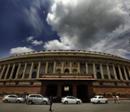
New Delhi, September 6: The fracas over coal block allocations continued for the twelfth day in Parliament today as BJP members vociferously demanded the resignation of Prime Minister Manmohan Singh.
Lok Sabha and Rajya Sabha were adjourned till noon after opposition triggered ruckus on the issue. Members of the DMK AIADMK, CPI and Viduthalai Chiruthaigal Katchi (VCK) were in the Well raising the Sri Lanka issue. DMK members were opposing the training of Sri Lankan armed forces at an airbase in India, while AIADMK and VCK members protested the upcoming visit of Sri Lankan President Mahinda Rajapaksa to Madhya Pradesh.
In the Lok Sabha, Speaker Meira Kumar took up the Question Hour after making an obituary reference to the victims of the fire tragedy in Sivakasu in Tamil Nadu.
After observing silence for a while, the BJP members trooped to the Well raising slogans against the Prime Minister over the coal block allocation.
As the din continued, the Speaker adjourned the House till noon. When the Rajya Sabha met for the day, it mourned the loss of lives in a devastating fire at a cracker manufacturing unit in Sivakasi in Tamil Nadu yesterday.
Soon after, the House the plunged into turmoil as BJP members shouted slogans demanding resignation of the Prime Minister. Some SP members were up on their feet but they could not be heard in the din.
Chairman Hamid Ansari tried to restore order in the House and called for first listed question of the day but BJP members were unrelenting. He then adjourned the House till noon.





Comments
Add new comment